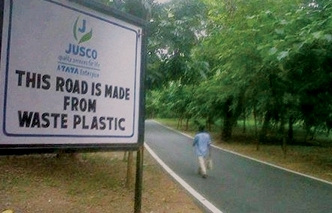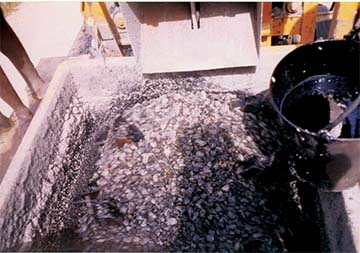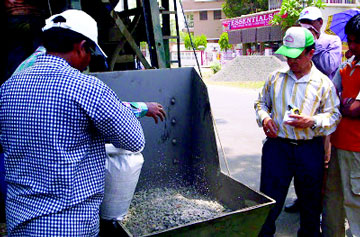Roads out of Plastic Waste
JUSCO's Initiative
In the current scenario of awakened environmental concern, plastic gets a bad reputation. Rather than an incipient environmental calamity, plastic can be beneficial if used it wisely. The common plastic litter-from thicker acrylics, bottles, grocery bags to wrappers can be processed into a partial substitute for bitumen in asphalt. Bitumen, also commonly known as Asphalt, is a sticky, black and highly viscous liquid or semi-solid form of petroleum. The primary use of bitumen is in road construction where it is used as the glue or binder mixed with aggregate particles to create asphalt concrete.
 |
Steel City Jamshedpur, has shown how plastic waste can be recycled to make roads, thereby minimizing environmental pollution caused by plastic. JUSCO, a 100% subsidiary company of Tata Steel which maintains and provides municipal services in Tata command area of the city, has constructed 12-15 kms road in the steel city as well as Tata Steel Works besides widening 22 roads using the environment-friendly technology of utilising waste plastic. Unlike other roads in India, this road has not developed any craters yet.
The eco-friendly road has not only become the talk of the town, residents from other parts of the city are also using this stretch to savour its smoothness. As far as we know, Jamshedpur is the only city in eastern India where bitumen technology (Dry Process) patented by Thiagarajar College of Engineering (TCE), Tirupparankuram, Madurai, has been implemented on accumulated waste plastic for the first time.
Claiming that there is no maintenance cost involved for the first five years, authorities say that for every stretch of such one km long and four metre wide road, one tonne of bitumen costing Rs 50,000 is saved.
The use of bitumen has been reduced by 7% ever since JUSCO began using waste plastic in road construction work. The quality and longevity of roads made of waste plastic-aggregate-bitumen was two times better than bitumen road. Besides being water resistant, it has better binding property, higher softening point, can withstand high temperature and higher load, has lower penetration value, costs less as compared to bitumen road and has no toxic gas emission.
From Plastic Waste to Plastic Roads
Plastic material is a synthetic or semi-synthetic organic solid that are mouldable. Plastics are typically organic polymers of high molecular mass. The use of plastic and related materials is increasing tremendously due to growth in population, urbanization and modern life style. Municipal solid waste in India contains 1-4% by weight of plastic waste. India's rate of recycling of plastic waste is the highest (60%) in the world as compared to other countries (China 10%, Europe 7%, Japan 12%, South Africa 16%, USA 10%). As a source of hazard to environment, plastic account for 16% of chlorine in the environment and have 54 carcinogens, polythene bags for disposal if burnt irresponsibly releases highly toxic gases like phosgene, carbon monoxide, chlorine, sulphur dioxide, nitrogen oxide, besides deadly dioxin.
 |
India generates 56 lakh tonnes of plastic waste annually, with Delhi accounting for a staggering 689.5 tonnes a day. Total plastic waste which is collected and recycled in the country is estimated to be 9,205 tonnes per day (approximately 60% of total plastic waste) and 6,137 tonnes remain uncollected and littered.
Wastes plastics are not disposed scientifically due to their non-biodegradability hence the disposal of waste plastic is now become a very big global problem. Recently, this waste plastic material is used as additives in road construction. Generally bitumen is used as binder in road construction and binding capacity of this bitumen is low but when plastic waste is mixed with hot bitumen and the resulted mix is used for road construction increase binding capacity of bitumen. The use of this innovative technology will not only strengthen the road construction but also increase the road life as well as will help to improve the environment. Plastic roads would be a boon for India's hot and extremely humid climate, where temperatures frequently cross 50°C and torrential rains create havoc, leaving most of the roads with big potholes.
 |
It is being observed that around 5% of toxic plastic,in different shapes and forms,ispresent in all municipal solid waste. Polybagsand other objects made out of plastic have become a menace and are common inbothurbanandruralscenario. Inspired with the success receivedfrom this project, JUSCO was determined to explore the possibilities of using plasticwastein constructing the town's roadsatanextensive scale.
To counter such problems the city will now have strong, durable and eco friendly roads which will also relieve the residents from heaps of plastic waste.
Plastic Wastes used in process
The following types of waste plastic can be used in the construction of rural roads:
- Films ( Carry Bags, Cups) thickness up to 60micron (PE, PP and PS)
- Hard foams (PS) any thickness
- Soft Foams (PE and PP) any thickness.
- Laminated Plastics thickness up to 60 micron (Aluminium coated also) packing materials used for biscuits, chocolates, etc.,
- Poly Vinyl Chloride (PVC) sheets or Flux sheets should not be used in any case.
The procedure of using plastic with bitumen for constructing roads is given as:
Step 1:Plasticwastethatconstitutesofpolythene,thermocol,plasticcups etciscutintoapropersize,between2.36mmand4.75mmbyashreddingmachine.
Step 2: Bitumen is heated to a maximum of 1700C to facilitate high?quality binding as well as to prevent weak bonding. (Atthisstagemonitoringthetemperatureisveryimportant)
Step 3: Inthemixingchambertheshreddedplasticwasteisaddedtothehot aggregate. Around8%ofplasticisaddedtobitumen. It gets coated uniformlyover the aggregate in 30 seconds, and an oily look plastic coated aggregate isobtained.
Step 4: Hot bitumen is then added over the plastic coated aggregate and theresulting mix is used for road construction. Theroadlaying temperature isbetween1100Cto1200C.
Characteristics of the process
- Easy process without any new machinery
- Simple process without any industry involvement
- In situ process
- Use of lesser % of bitumen and thus savings on bitumen resource
- Use of plastics waste for a safe and eco-friendly process
- Both Mini Hot Mix Plant and Central Mixing Plant can be used
- Only aggregate is polymer coated and bitumen is not modified
- Use of 60/70 and 80/90 bitumen is possible
- No evolution of any toxic gases like dioxin
- Fly ash can also be used to give a better performance
Man behind the Mission
JUSCO was trying toadopt various methodologies to tackle the menace, plasticwaste, andto useitin amannerwhich is productive. Subsequently, this subsidiary of Tata Steel consulted Dr. R. Vasudevan of Thiagarajar College of Engineering (TCE), Maduraito learn the skill ofusingplasticwasteinmakingroads.
Dr. R. Vasudevan, Dean and Head of the Chemistry Department of the Thiagarajar College of Engineering (TCE) is the man behind this mission and hence is known as Madurai's 'Plastic Road Man'. The first ever plastic road (60 feet long) was laid inside the TCE campus in 2002, followed by a 700 m road in Lenin Nagar, Kovilpatti, and the same year. Officially, the industrial town of Salem was the first in the country to lay a 350 m road on an experimental basis using plastic tar technology in 2004. In his opinion, is a “gift from the gods”; it's up to humans to use it wisely.
In recent years his method has been gaining recognition. He's become known as Plastic Man and travels throughout India instructing engineers how to apply it. The college holds a patent for his technique but often licenses it for free. To date, more than 5,000 km (3,000 miles) of plastic roads have been laid in at least 11 states. The Central Pollution Control Board and the Indian Roads Congress, two leading government bodies, have endorsed the method.
Almitra Patel, one of India's leading experts on garbage, who has advised several state governments on their waste policies, considers Vasudevan's technology a “win-win-win.” It consumes an unwanted and mostly non-recyclable resource; it results in stronger roads; and because it replaces as much as 15% of more expensive bitumen in the mix used to lay roads, the technology also holds the potential to lower the cost of infrastructure.
She adds that one of the chief advantages of Vasudevan's method is that it can accommodate the multilayered wrappings often used to pack snacks such as chips and cookies. These wrappings (typically consisting of a layer each of plastic, polyester, and aluminium) make up an increasingly large volume of waste in the country. They're just about impossible to recycle, but they can easily be shredded and reused in Vasudevan's roads.
Patel considers this as an absolutely transformational technology that could clean up India overnight. Another advantage of Vasudevan's method is its simplicity. It requires no significant technical knowledge and no large investments or changes to existing road-laying procedures. His whole operation is a good example of the Indian method known as jugaad, or “frugal innovation.” Jugaad makes a virtue of necessity: It extols the work-around, the shortcut that uses (and sometimes improves on) limited resources. “I do it all the Indian way,” Vasudevan says. “What is the use to spend thousands of rupees when we can do it much more cheaply?” Vasudevan, 69, spent the first few decades of his career inducting students into what he calls “the wonders of chemistry” before turning his attention to plastic in 2001.
Journey of Replication
In other parts of the country, too, roads have been made from plastic waste. In 2002, such a road was built in Madurai, Chennai and Tiruchi. Other places which have plastic waste roads are Mumbai, Puducherry, Kochi and Simla.
Another example of usage of plastic waste on roads was done in Pune in 2011 by the Pune Contentment board at a half kilometer stretch. Next in line was Chennai recently when an announcement of 1100 km of roads in plastic over the next decade. Observers are happy for bringing in a greener environment around us - however care has to be taken to bring this movement to better speed and not stop in plans.
JUSCO has received a number of requests to duplicate this technology from states such as, Chattisgarh, Himachal Pradesh, Uttarkhand and Jharkhand. It has also received a request from Nigeria, whose government wants to replicate it in their country. However, JUSCO has no plans of commercialising this discovery, only to use it to serve society.
Plastic roads vs conventional roads
- Overall reduction in bitumen consumption by 10-15%
- Enhanced load carrying strength
- Less wear and tear, i.e. longer life
- Laying 1 Km of road requires 10 Lakh carry bags
- Prevents release of 3 tonnes of CO2 (through disposal by burning) into the atmosphere
- Increased road strength (Marshall Stability Value)
- Excellent resistance to water and water stagnation
- No stripping and potholes.
- Enhanced binding and better bonding of the mix.
- Less rutting and ravelling.
- Improved soundness property.
- Negligible maintenance cost of the road.
- No leaching of plastics.
- No effect of UV radiation.
References: